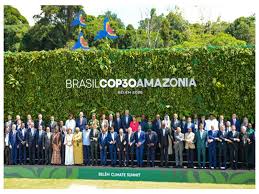Delivering India’s national statement at the Leaders’ Summit of COP30 on November 7, Indian Ambassador to Brazil Dinesh Bhatia reaffirmed the country’s steadfast commitment to climate action, grounded in equity, national circumstances, and the principles of Common but Differentiated Responsibilities and Respective Capabilities (CBDR-RC). The 30th Conference of the Parties (COP30) to the UN Framework Convention on Climate Change (UNFCCC) is being held in Belem, Brazil, from November 10 to 21.
India expressed gratitude to Brazil for hosting COP30 on the 10th anniversary of the Paris Agreement and highlighted the 33-year legacy of the Rio Summit. Ambassador Bhatia noted that the summit provides an opportunity to reflect on the global response to climate change and celebrate the principles of equity and CBDR-RC, which laid the foundation for the international climate framework, including the Paris Agreement.
India welcomed Brazil’s initiative to establish the Tropical Forests Forever Facility (TFFF), describing it as a major step toward collective and sustained action to preserve tropical forests, and announced that India would join the Facility as an Observer.
Highlighting India’s low-carbon development trajectory under Prime Minister Narendra Modi, the statement noted that between 2005 and 2020, the country reduced the emission intensity of its GDP by 36%, a trend that continues. Non-fossil power now accounts for over 50% of India’s installed capacity, enabling the nation to achieve its revised NDC target five years ahead of schedule.
The statement also underscored India’s expansion of forest and tree cover, contributing an additional carbon sink of 2.29 billion tonnes of CO₂ equivalent between 2005 and 2021. India has become the world’s third-largest producer of renewable energy, with nearly 200 GW of installed renewable capacity. Global initiatives like the International Solar Alliance, which now brings together over 120 countries, promote affordable solar energy and foster South-South cooperation.
India emphasized that, a decade after the Paris Agreement, many nations’ NDCs remain insufficient. While developing countries continue to take decisive climate action, global ambition remains inadequate. Ambassador Bhatia highlighted the urgent need for developed countries to accelerate emission reductions and deliver the promised, adequate, and predictable support, given the rapid depletion of the remaining carbon budget.
The statement stressed that affordable finance, access to technology, and capacity-building are critical for implementing ambitious climate targets in developing nations. Equitable, predictable, and concessional climate finance remains essential for achieving global climate goals. India affirmed its readiness to collaborate with other countries to implement solutions and transition toward sustainability in ways that are ambitious, inclusive, fair, and equitable, based on the principles of CBDR-RC and national circumstances.
Reaffirming its commitment to multilateralism and the preservation of the Paris Agreement framework, India called on all nations to ensure that the next decade of climate action is defined not just by targets but by implementation, resilience, and shared responsibility founded on mutual trust and fairness.















